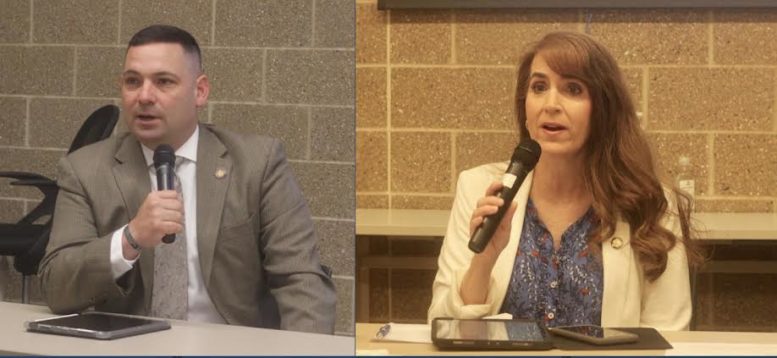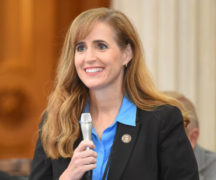By DAVID DUPONT
BG Independent News
State Senator Theresa Gavarone and State Representative Haraz Ghanbari, both Republicans, had plenty to offer to update the Bowling Green Chamber of Commerce.
The Chamber held its annual legislative update Friday. Joining Gavarone and Ghanbari was Chancellor of Higher Education Randy Gardner. A story on his remarks will be published separately.
Gavarone presented a list of legislative initiatives that have “made it to the finish line.”
These included spending that benefits local entities in the capital budget; the passage of the anti-hazing bill Collin’s Law; calling for enhanced penalties for trafficking drugs in the vicinity of a drug rehabilitation center; and forbidding any restrictions on school athletes wearing religious apparel.
That bill was prompted by the disqualification of a runner from Sylvania in district competition because she wore a hijab. Gavarone noted that the legislation brought Christians, Jews, and Muslims together.
The drug trafficking bill grew out of her discussion with Wood County Prosecutor Paul Dobson. Often drug pushers will wait outside rehabilitation centers to try to sell or give away drugs to the vulnerable clientele within.
She also touted the passage of Collin’s law, which she said, “stemmed from the death of Stone Foltz,” a BGSU student in March 2021.
Anti-hazing legislation, including a House bill sponsored by Ghanbari that stalled in the Senate, had been in the works before Foltz’ death as a result of a fraternity initiation. The name Collin’s Law, sponsored by Stephani Kunze, R-Hilliard, refers to an Ohio University student, Collin Wiant, who died in a hazing incident in 2018.
Foltz’ death gave added momentum to push the bill through.
Two former BGSU students were recently found guilty of hazing and other misdemeanor charges in Foltz’ death. Under Collin’s laws those would have been felonies carrying stiffer penalties.
Gavarone also spoke of her sponsorship for putting a constitutional amendment before voters in November that would require judges to consider public safety when setting the amount of cash bail. An Ohio Supreme Court has ruled that while public safety can be a consideration in setting other restrictions on someone accused of a crime, it cannot figure into how much cash bail is required.
Ghanbari in his opening remark also addressed public safety.
“I believe that public safety is the foundation of everything in our community,” Ghanbari said, “A good safe community – everything builds off that.”
He spoke in detail about the money in the capital budget that will improve communications among public safety agencies.
Multi-Agency Radio Communication System – MARCS – will improve communications among the BGSU police, Bowling Green City police and fire, and the state highway patrol.
The budget also includes money to improve the county’s computer-aided dispatch system. This could facilitate, he said, the creation of joint fire districts in the southern part of the county. “In order to have those conversations we need to make sure a CAD system is in place.”
Ghanbari said an incident during a ride-along with police that involved a shooting “reinvigorated in me the importance of investing in communications platforms.” Though help was nearby, the officer could not connect with the other unit.
Ghanbari also pushed through a bill that makes it harder for thieves to sell stolen goods online, through Amazon and other retailers.
Thieves working in teams can steal thousands of dollars of merchandise from stores, and then sell it online. The legislation heightens the registration requirements for accounts that sell over a certain number of items or dollar amount of goods.
Ghanbari noted that Amazon, which has a fulfillment facility in Rossford within his district, sent a lobbyist to speak to him about the company’s opposition to the legislation.
While he appreciates the company’s doing business in the district, he was undeterred. He believes online sales companies will see increased business if consumers are assured the goods they purchase are neither stolen nor counterfeit.
Ghanbari also spoke of legislation that will allow township police to patrol on I-75. He said guardrails had been put into place to assuage some of the concerns expressed about the practice. The township, for example, must have an entrance and exit to the highway within its jurisdiction.
He also said that the proceeds from any tickets will not go “to pad the coffers of the townships.” Instead those funds will go toward highway maintenance or to the municipal court system.
Unprompted, Ghanbari delved into a couple hot button issues.
Bans on teaching of Critical Race Theory in schools have found their way in several pieces of legislation now before the legislature. He said he could still get called back for hearings on these.
“I think these issues dealing with Critical Race Theory and those kinds of things being discussed are best handled at the local level,” he said. “These are the folks who are closest to the material being taught in local schools.”
This is consistent with his support of local control and less big government, he said.
Local control was also behind Ghanbari’s support for a bill that reduced the number of training hours for teachers who want to carry weapons in schools. The bill leaves it up to local school boards and teachers to decide how to respond.
The legislators were asked what the most critical issue was facing their constituents and what are they doing to help.
Gavarone said rising prices, particularly “skyrocketing gas prices” combined the paying more for groceries, were “hitting people hard.”
Ghanbari agreed, though he said, the answer depends on what constituents he’s talking to.
The business community is still having a difficult time finding employees who are qualified and will show up for work. That holds true, as well, for public safety agencies.
Gavarone said that at Mr. Spots, the Bowling Green restaurant owned by her and her husband, Jim, they have now been able to hire staff, though the price of food continues to climb.
Ghanbari said he was also very concerned about divisive rhetoric that’s driven by “the far right and far left.”
“We need to come back to having consensus,” he said.
Ghanbari said despite the increasing gas prices, he does not favor rolling back the gas tax. If that were to happen, he said, “many of the programs and investments being made right now will come to a screeching halt, and when it comes time to restart those projects, they will cost significantly more.”
Gavarone said as a member of the Small Business and Economic Opportunity Committee she has been working hard to eliminate “burdensome red tape and regulations” in order to keep Ohio “very business friendly.”
She said the state is also looking at reciprocity with licensing, to make it easier for people who move here from different states to continue their professions and businesses here.
Later in the discussion, Ghanbari said any move to grant reciprocity in licensing should come with assurances that the other state has the same high standards as Ohio.
He also cautioned against going too far with cutting regulations. “Some are necessary to keep industries safe and communities safe. So I want to make sure when we look at those regulations that we’re not taking something off the books that can have a negative impact in our communities.”




